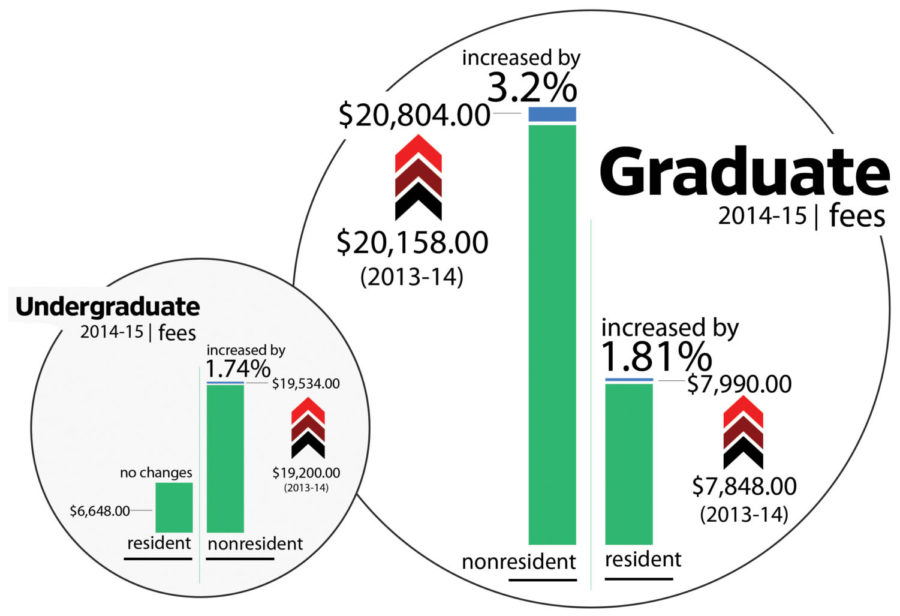Tuition to increase for nonresident graduate students
Graphic: Azwan Azhar/ Iowa State Daily
Tuition and fees for the fiscal school year of 2014-15 has some changes. Especially nonresident students in the Graduate College, the tuition fee increased by a certain percentage.
December 10, 2013
The cost of graduate student tuition is an item on the rise for the next fiscal school year.
Resident tuition for undergraduate students is expected to remain the same while nonresident tuition for undergraduates is expected to rise 1.74 percent. Yet, those who will see the highest increase in tuition are the graduate students, with a 1.81 percent increase for resident students and 3.2 percent for nonresident graduate students.
Jonathan Wickert, senior vice president and provost, said the increase in tuition is within and under the Higher Education Price Index, which is focused on higher education institutions. The index range for the fiscal year 2015 is 1.8 to 3.2 percent.
“We are pleased to achieve a 0 percent tuition increase for resident undergraduates in fiscal year 2015, and an increase of only 1.74 percent for nonresident undergraduate students,” Wickert said, “For graduate students, the increases of 1.81 percent for residents and 3.2 percent for nonresidents, are also within the HEPI range.”
Wickert said graduate students — compared to undergraduate students — tend to have more specific needs. These needs include more faculty, using more expensive facilities and enhancement of professional development.
The increase for graduate tuition will assist in professional writing and proposal planning, improve the quality of graduate programs and enhance student success.
“Graduate students will also see a more streamlined, student-friendly approach for application, admission and degree completion. We are also working to improve the Program of Study process,” Wickert said.
Wickert added, hiring of faculty in areas of graduate student interest continues to be a priority.
Anna Prisacari, president of the Graduate and Professional Student Senate, said the increase is aligned with the current proposal and is parallel to the approach taken by the Board of Regents last year and will help improve graduate students education.
“New revenue that this increase will generate will be used for a number of ongoing projects to improve the overall quality of the graduate experience at Iowa State,” Prisacari said.
Wickert said the reason for not having a freeze for graduate students is to accommodate for their specific education.
He said graduate students have more specialized needs, requiring Iowa State to invest more resources to provide high quality graduate education.
“While we are confident we can meet the demands of our undergraduates with the combination of a resident tuition freeze and increased state support, maintaining our high-quality graduate education requires additional resources,” Wickert said.
The veterinary medicine and architecture students will see an additional increase in tuition to provide small classes and high quality materials. The increase in veterinary medicine will provide students with state-of-the-art equipment, clinical learning experiences and hands-on field experience Wickert said.
“Iowa State works hard to squeeze the most value out of every tuition dollar. We are constantly working to improve our efficiency, which not only helps keep tuition rates low, but also generates savings that can be reinvested back into our programs and student services,” Wickert said.







